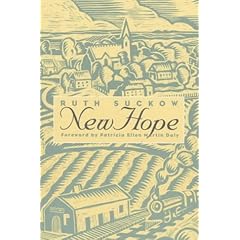
Ruth Suckow’s New Hope (1942) is a charming novel, worth reading if you're interested in old-fashioned women's fiction. Her books turn up at midwestern library sales, because Suckow was born in Iowa, a once popular writer whose novels portray the details of family life, on farms or in small towns in Iowa. Set at the turn of the 20th century, this novel is quietly entertaining: it centers on the arrival of a new minister and his family in New Hope, and tells the story of two years in this quiet backwater. At first the Greenwoods are guests at the hospitable Millers' because the parsonage is not yet ready. Dave Miller, a banker, takes them for rides in the buggy around town and in the country and boasts about the growing small town; we learn the history of the town, of the Old Community (flooded, and then moved to the new location), about the railroad, the water supply, and the different businesses. Bertha Miller and her three daughters spend a great portion of each day cooking, and though the daughters try to keep Bertha out of the kitchen, she makes frequent surreptitious visits. Bertha also has a soft spot for feeding tramps. They get off the train and head for the Millers'.
“Ja, they don’t know where to find their food,” Bertha murmured. “They ain’t got anywhere to look to....”
There was plenty of food in that house anyway. Such cooking as went on! Every day was baking day. And when the regular baking was done, one of the girls would cry, “Do you know we haven’t a bit of candy in this whole house?” There seemed to be always at least one great batch of fudge set out in long baking pans in the back kitchen to cool. All three of the Miller girls were famous fudge makers. “Bess’s fudge,” “Edie’s fudge,” “Irene’s fudge” - each kind had its defenders among the connoisseurs of the town. Mrs. Greenwood, however, couldn’t be prevailed upon to give any opinion; she would only laugh and say, “I like all of them better than is good for me!” She said with some anxiety she never saw the two children when they weren’t licking candy spoons.
Suckow's novels are a good source for midwestern women’s history, particularly in daily life. I very much enjoyed her novel The Folks. I'm only 100 pages into this one, but am finding it delightful. There's no plot - a negative in a novel - but it somehow captures the rhythms of a life I remember from my grandmother's farm. Suckow's style is very, very plain. She isn't a Willa Cather, or a Susan Glaspell, but has her merits.
Query: does anyone know why old library books smell so delicious? My copy of is a discarded library book. The cover is orange, with an illustration of a small, rather ugly midwestern town - not an English village - and the book smells the way old-fashioned library books used to smell, perhaps of the library bindings (textured pasteboard?), perhaps of the cream-colored paper.
And (I'm adding this just for fun) the pocket on the inside cover amusingly reads:
Borrowers
Each borrower registering will be assigned a number by which his books will be charged. He will be held responsible for all books charged to this number.
Number of volumes
Varies. Ask at library for latest rules
Time Kept
Seven day books 7 days only.
All other books 14 days.
(Books for serious reading or study, one month.)
Renewals
Will be granted for all but 7 day books. Books renewed by telephone.
Fines
Two cents a day is charged for all books kept overtime.
2 comments:
This book sounds delightful. I really don't mind a novel not having much of a plot when it is well-written otherwise. I like reading about the daily lives of ordinary people. All the better when you get the extra bonus of a note or other paraphernalia in it.
It's an enjoyable novel, though nothing much has happened so far.
Post a Comment